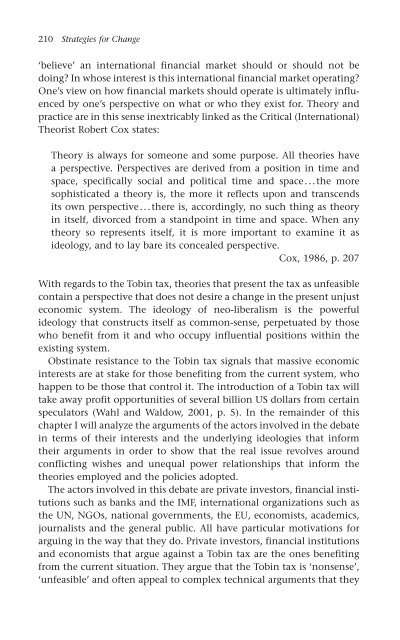3071-The political economy of new slavery
3071-The political economy of new slavery
3071-The political economy of new slavery
You also want an ePaper? Increase the reach of your titles
YUMPU automatically turns print PDFs into web optimized ePapers that Google loves.
210 Strategies for Change<br />
‘believe’ an international financial market should or should not be<br />
doing? In whose interest is this international financial market operating?<br />
One’s view on how financial markets should operate is ultimately influenced<br />
by one’s perspective on what or who they exist for. <strong>The</strong>ory and<br />
practice are in this sense inextricably linked as the Critical (International)<br />
<strong>The</strong>orist Robert Cox states:<br />
<strong>The</strong>ory is always for someone and some purpose. All theories have<br />
a perspective. Perspectives are derived from a position in time and<br />
space, specifically social and <strong>political</strong> time and space...the more<br />
sophisticated a theory is, the more it reflects upon and transcends<br />
its own perspective...there is, accordingly, no such thing as theory<br />
in itself, divorced from a standpoint in time and space. When any<br />
theory so represents itself, it is more important to examine it as<br />
ideology, and to lay bare its concealed perspective.<br />
Cox, 1986, p. 207<br />
With regards to the Tobin tax, theories that present the tax as unfeasible<br />
contain a perspective that does not desire a change in the present unjust<br />
economic system. <strong>The</strong> ideology <strong>of</strong> neo-liberalism is the powerful<br />
ideology that constructs itself as common-sense, perpetuated by those<br />
who benefit from it and who occupy influential positions within the<br />
existing system.<br />
Obstinate resistance to the Tobin tax signals that massive economic<br />
interests are at stake for those benefiting from the current system, who<br />
happen to be those that control it. <strong>The</strong> introduction <strong>of</strong> a Tobin tax will<br />
take away pr<strong>of</strong>it opportunities <strong>of</strong> several billion US dollars from certain<br />
speculators (Wahl and Waldow, 2001, p. 5). In the remainder <strong>of</strong> this<br />
chapter I will analyze the arguments <strong>of</strong> the actors involved in the debate<br />
in terms <strong>of</strong> their interests and the underlying ideologies that inform<br />
their arguments in order to show that the real issue revolves around<br />
conflicting wishes and unequal power relationships that inform the<br />
theories employed and the policies adopted.<br />
<strong>The</strong> actors involved in this debate are private investors, financial institutions<br />
such as banks and the IMF, international organizations such as<br />
the UN, NGOs, national governments, the EU, economists, academics,<br />
journalists and the general public. All have particular motivations for<br />
arguing in the way that they do. Private investors, financial institutions<br />
and economists that argue against a Tobin tax are the ones benefiting<br />
from the current situation. <strong>The</strong>y argue that the Tobin tax is ‘nonsense’,<br />
‘unfeasible’ and <strong>of</strong>ten appeal to complex technical arguments that they


